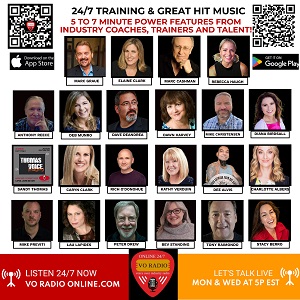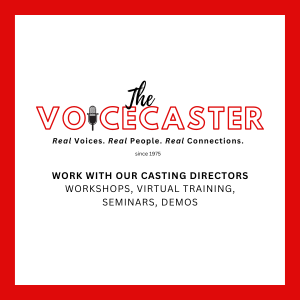The Voice Over Rate Card:
Edge Studio’s Guide To Fees
By David Goldberg
Producer / Coach
Edge Studio
 What’s a fair rate to charge your clients? It’s a nagging question, especially in today’s roiling economy. What’s a fair rate to charge your clients? It’s a nagging question, especially in today’s roiling economy.
Edge Studio, the voice-over training and production company, has put together a sample rate card for non-union buyout jobs - reflecting average and realistic dollar amounts being fairly charged within the industry.
A buy-out is a flat rate which "buys" the right to use your voice. All non-union jobs are considered to be buy-outs. They do not offer residuals, which are extra compensation for commercial voice-overs beyond the initial payment, based on the number of times the spot is run.
Note: For union rates, please visit the union web sites:
Following is a link to the non-union rate card, plus general advice for:
- discussing rates with clients,
- extra charges,
- per-hour vs. per-job considerations,
- and home studio add-on fees.
SEE NON-UNION RATES FOR …
Of course, use the Voice Over Industry Rate Card only as a guide. Rates will vary from city to city, client to client, job to job, and voice talent to voice talent.
But here, you will find suggestions on what to charge for:
- Broadcast: Radio, TV, Promo, Trailer, Imaging
- Non-Broadcast and Broadcast: Animation, Cartoon, Videogame …
- Non-Broadcast: Audiobook, Corporate, Industrial, Training Video …
- Non-Broadcast and Broadcast: Dubbing
- Non-Broadcast: Education, eLearning, ESL …
- Non-Broadcast and Broadcast: Film, Video, Documentary …
- Non-Broadcast: Medical, Pharmaceutical …
- Non-Broadcast: Telephony, IVR, On-hold, Menu Prompts …
- Non-Broadcast: Web, Online Tutorial, Flash …
LINK TO RATE CARD
Ready? To view this handy guide, please visit:
WHEN DISCUSSING RATES ...
Always openly discuss rates and the method of payment with your clients and set rates - before the recording begins.
Also, only discuss rates with the person with whom you set the original rate.
When first discussing rates with a client, be comfortable with asking for more details about a project prior to giving them a firm price.
And remember that rates through online subscription audition services may vary significantly.
CHARGE POINTS
Generally, you can charge more for:
- traveling more than one hour to your client’s studio
- reading to picture (timing your read to fit with the visuals/graphics)
- providing voice-over in a less common language or special vernacular (medical, legal...)
When charging “per hour”:
- always set a 1-hour minimum
- after the first hour, charge in 1/4-hour increments
- consider offering a discount after the first hour (such as $250 for the 1st hour, $150 for every hour after that)
PER HOUR VS. PROJECT?
Should you charge "per hour" or "per project"?
In general, if you don’t know how long the project will take, charge per hour because you are likely to make more money.
If you record quickly, you may not make as much money on “per hour” projects in the short term, but you will gain a reputation for being a dependable, cost-effective talent, which will lead to booking more jobs in the long term.
HOME STUDIO CONSIDERATIONS
Usually, expect to invoice your client the same fee whether you record at your home-studio or if you’re brought into their studio.
But there are exceptions. We recommend charging more from your home-studio for:
- Separating the audio into multiple files, and naming them: Charge $1 per file
-
Phone-patch: Charge between $10 to $25 per “connection” fee
- ISDN and Source Connect: Charge between $25 to $100 more per hour
-
Translation / localization: If you farm it out, mark-up a discounted price 25%
-
Reading to picture (timing your read to fit with the visuals/graphics): Charge between 10% to 25% extra
-
Reading to lip sync (timing your read to fit with a speaker’s mouth): Charge between 25% to 50% extra
- Copy writing / editing: Charge between $25 to $100 per hour
- Music / sound effects: If you farm it out, mark-up a discounted price 25%.
David Goldberg is a voice-over producer, coach, and the owner of Edge Studio, a major voice-over recording studio and voice-over education company based in New York City, with additional studios in Fairfield, CT and Bethesda, MD. Edge Studio offers a large variety of in-person and telecourse workshops, and also produces audio for major clients including Disney, VW, Microsoft and National Geographic. The studio frequently casts voice talent who have trained and produced demos there.
Voice Over Industry Rate Card:
|
 What’s a fair rate to charge your clients? It’s a nagging question, especially in today’s roiling economy.
What’s a fair rate to charge your clients? It’s a nagging question, especially in today’s roiling economy. 
.png)







What should be on your rate card too? I'm looking to do any voiceover/voicework, written and produced commercials, telephone hold voicing, etc....
Thanks,
Brian